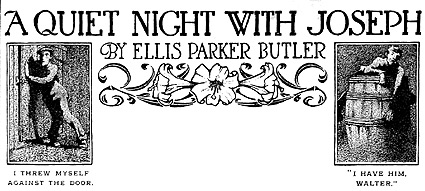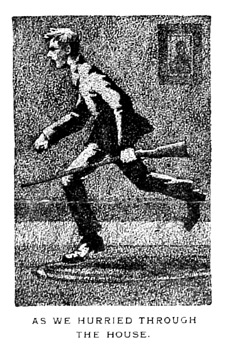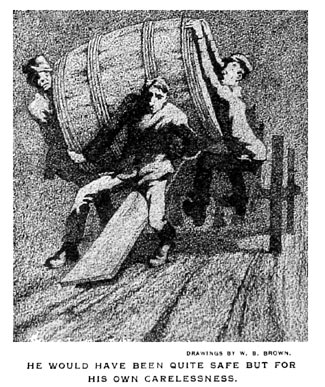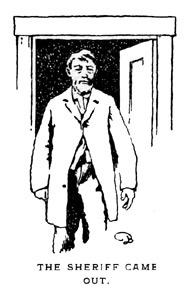from Youth's Companion
A Quiet Night with Joseph
by Ellis Parker Butler
Joseph had stayed all night with me a number of times, perhaps twelve, before he asked me to spend the night with him, and even when he at last invited me he did it rather diffidently. "You see," he said, "it is so quiet and stupid on a farm at night that I am afraid you'll feel lonely and homesick, especially as you and I will be nearly alone. There is always such a jolly crowd at your house."
Joseph was my chum and classmate in the A year at the high school. His father had a farm some five miles out of town on the Grantham road, and Joseph walked in every morning and out every night.
He did not mind the walking, for he was almost a six-footer, and big and strong in proportion, but when the weather was particularly bad he would sometimes consent to stay all night with me.

"All right," he said, in his solemn, serious way. "If you are willing to spend a quiet evening with a farmer, and go to bed early and rise before the sun, and if you think you won't be bored to death, come along. But I warn you that it will be pretty dull."
I was glad enough to visit him, and was quite willing to take the risk of being lonely, and I told him so.
We started as soon as school was dismissed for the day; and as it was Friday, this was early. The walk in the crisp winter air was delightful. I liked walking, and I liked talking to Joseph, and I liked hearing him talk, especially the last.
He was so intensely serious in all he said and did that I suppose he made an effective foil to my more hasty and shallow character; his deliberate speech and movements seemed to me the acme of sedate manliness.
When we reached Joseph's home we found no one there except the hired man and the kitchen girl, for Joseph's father and mother had driven down to Grantham to an anniversary party, and were to stay all night.
I followed Joseph round while he did his chores at the barns, and then it was suppertime, and after that we played checkers until we both began to yawn so that we could not see the checkerboard. Then we went upstairs to bed.
As we climbed the stairs Joseph insisted on apologizing again for the quiet evening.
"You see," he drawled, "it is very different from life in the city. Agriculture has a quieting effect on mankind."
Then he went on with one of his long, slow, philosophical talks that had a far more quieting effect on me than my agricultural experiences had had, for if I was half-asleep when we started, I was quite asleep before I tumbled into the bed.
But almost before I touched my pillow, as it seemed to me, I felt some one shaking me, and with my eyes half-open I saw it was Joseph. He was partly dressed, and I sleepily asked him if it was morning.
"No, Walter," he said, "it is not morning, but I have wakened you because I thought you might like to vary the monotony of your country experiences. Get up!"
He finished dressing more rapidly than I should have thought possible. I fairly jumped into my clothes, and before I was dressed I was sufficiently awake to ask him the reason for turning out at that hour.
Joseph explained, very briefly for him, that they had been missing a good many chickens lately, and that he had just heard a suspicious commotion in the chicken house. He was going out to catch the chicken-thief.
"Chicken thief!" I exclaimed. "Won't we get shot?"
I really had no wish to intrude on a gentleman in the pursuit of his vocation if he was in the habit of shooting.
"Chicken-thieves do not shoot, Walter," said Joseph; "they get shot."

He said it in a manner that seemed to leave no room for argument, and to prove his point he picked up a shotgun as we hurried through the house.
He motioned to me to walk quietly, and as he opened the kitchen door the cold winter wind blew full in our faces, I do not like to admit that I was in the least frightened; I like to think it was the cold; but for some reason or other my teeth began to chatter. If I was frightened, you must remember that I was not used to quiet country nights.
As we crept toward the chicken-house, Joseph told me in careful detail what he intended to do.
There was one window in the chicken-house, some eight feet above the ground, and the only entrance was the door. The door had a strong bolt on the outside and opened outward, so that it would be an easy matter to push the door shut and bolt it.
He asked me if I could do that, and I tried to say no, but my teeth were clicking so that Joseph seemed to think I had used the telegraphic code word for yes.
While I was closing the door Joseph intended to stand beneath the window, and when the thief, if he happened to be inside, tried to get out of the window, Joseph would, as he said, capture him. There was a large hogshead below the window, and Joseph thought that he could stand up on that and reach the thief as he emerged.
It was all so simple and easy that I wanted to tell Joseph he would have plenty of time to shut the door and run round to the window before the thief could get out, but it did not take nearly so long to reach the chicken-house as it has taken me to tell it, and I only managed to chatter, "Cuk -- cuk -- can't --" before we were there.
"Now!" shouted Joseph, and in sheer desperation I threw myself furiously against the door and pushed it shut and slipped the bolt into place.
It was much easier than I had thought, but I felt like a hero when I had done it, or, at least, as much like a hero as a person who is shaking from head to foot can feel.
I had never in my life thought there was any particularly pleasant side of a chicken-house, but I was at that moment supremely glad that I was on my side of that chicken-house instead of on Joseph's side.
I decided to stay right there and guard the door, whatever might happen. It seemed the safest place.
We had undoubtedly caught our thief, for at the moment the bolt slipped I heard him jump for the door.
Then I heard Joseph say, "Ah, ha!" or something of a like nature, and there was a shot, and more scrambling, and the squawking of chickens, and a lot of tumbling, and then the noise of breaking ice and splashing water, and Joseph called to me, quite calmly.
I managed to force myself round the corner of the chicken-house, and what I saw was Joseph, lying on his stomach across the top of the hogshead, bearing down with all his weight and strength on the lid.
"I have him, Walter," he said, in his gentle drawl, "but I can't go away from here or he will get out, and he has a pistol. Run to the tool-house --"
I would have told him that I could not run to the tool-house if I had been able to tell him anything, but I was saved the necessity of trying to get any words between my lively teeth by the appearance of the hired man, who had been roused by the shot
"Mike," said Joseph, with remarkable calmness, "I have our chicken-stealer in this hogshead, but I can't get down because I have to hold the lid on. Just run to the tool-house and get the hammer and nails."
Mike ran. I can still remember the remarkably broad angles his legs made as he went to the tool-house and back.
Joseph told him what to do next. The lid fitted snugly on a cleat inside the hogshead, and Mike drove half a dozen nails through the side of the hogshead into the lid. It was not as easy to do as it sounds, for the hogshead was solid oak.
Joseph said afterward that the chicken thief said a good many interesting things while the lid was being nailed on, but I did not hear him, partly on account of the noise my teeth were making and partly because the chickens the thief had taken with him into the barrel kept squawking so.
But when Joseph got off the lid the man in the hogshead shot again. It sounded like a giant firecracker in a barrel, but the man fired the pistol only once.
He must have been nearly deafened by the noise; you know how sound is multiplied in a confined space. It was pure nonsense for the man to shoot, anyway, as the oak was so thick that the balls of his small caliber pistol could not penetrate it.
When the lid was firmly nailed, Joseph stood back and looked at the hogshead. "There are two things we must do without delay," he said, after he had satisfied himself that Mike had made a neat job. "One is to let in some air, and the other is to let out some water."
The hogshead had been half-full of water when the thief fell into it, and the water had had a good coating of ice on top, so you can understand that the man in the barrel was in a rather uncomfortable place. It was not like Joseph to let a human being suffer needlessly, even if that human being were a chicken thief.
Joseph sent Mike to the tool-house again, this time for the brace and bit, and when they were brought, Joseph began boring holes in the top of the hogshead.
He bored them in the top so that if the man wanted to shoot through his air holes he could only shoot up in the air, while if the holes were in the side of the hogshead, we might forgetfully walk before them and get hurt. Joseph never neglected details.
When he had made four air holes, which he said were quite sufficient to supply the prisoner, Joseph lay down in the snow and bored a hole near the bottom of the hogshead, and when he had this hole finished, the water spurted out in a very brisk and satisfactory manner.
"I am not sure," said Joseph, "that the man will think this a kindness, for I have noticed that one does not feel the cold while in the water nearly so much as when just out of the water, but it must be done for his own good. Otherwise he might get faint and fall in and drown."
We stood round, watching the water spurt out until the hogshead was empty, -- except for the man and the ice and the chickens, -- and then Joseph said:
"We must not let the man take cold. For if our captive took a bad cold, it might turn into pneumonia, and he might die."
So Mike brought some wood, and we made a small fire near the hogshead.
I think at first the man must have thought we intended burning him alive, for he made a great noise; but Joseph knocked on the barrel with the hammer to silence him, and then shouted his intentions.
After that the man kept still, but the chickens continued to squawk. You cannot reason with chickens.
When the hogshead was reasonably warm, the ice inside melted and ran out through the bung-hole Joseph had made, and in a little while the man called out, "Too hot!" and we moved the fire away a short distance.
After we had done that the man seemed as comfortable as could be expected under the circumstances, although he continued to complain, or rather to express his exasperation at the whole affair.
Whenever this became too unpleasant, Joseph knocked on the hogshead with his hammer until the man made less noise and the chickens more.
We stood for some time, discussing what we should do with the captive.
The hired man was in favor of going back to bed and doig something in the morning; but he did not suggest anything to do in the morning, and it was very evident that his main idea was to get back to bed as quickly as possible. I was quite willing to go back to bed, too, but I did not like to say so, and I was ready to do whatever Joseph proposed.
"I do not think it would be right to leave him here alone all night," said Joseph, "because when this fire burns out it will be fearfully cold in that hogshead, and we have no right to make the man suffer, even if he is a prisoner and a chicken thief. Neither do we dare to build a big fire and leave it, for besides the danger of baking him, there is the danger of the hogshead catching fire and roasting him. And I know none of us want to sit out here in the cold until daybreak. So the only thing to do is to take him to town and deliver him to the proper authorities."
The hired man grumbled at this and propounded a dozen reasons for not attempting it, but Joseph was inexorable, and there was nothing for Mike to do but to hitch the team to the farm wagon.
Then, while two of us watched the hogshead, the other went to the house and brought out our overcoats and comforters. Mike wanted to back the wagon into the chicken-yard, but to do so he would have had to break down a portion of the fence, and Joseph would not have it.
"We will roll the hogshead out to the wagon," he said.
"No, you won't, either," said the man in the hogshead, who had evidently been listening. "I won't be rolled."
Mike, who was disgusted with the whole proceeding, did not like this.
"You have nothing to say about it," he shouted, "and if you say much more we'll roll the hogshead end over end all the way to town!"
Joseph would have interposed, but the man spoke again.
"I tell you," he said, "if you roll me I'll kill these two chickens."
"Now see here, my friend," said Joseph, in a tone expressive of some impatience, "you will not kill those chickens. I do not get angry easily, but I have treated you with marked consideration. It has now become necessary to the interests of the community that your hogshead should be rolled a little, and if you retaliate on the chickens you will have to pay for it."
"If you roll me I'll kill the chickens," repeated the man, doggedly.
For answer Joseph motioned all of us to get on one side of the hogshead, and we slowly pushed it over on its side, keeping carefully away from the head, in which the holes had been made.
Then, quite as carefully, Joseph began rolling the hogshead toward the wagon.
At the first movement one of the chickens squawked excitedly, as chickens do when they are suddenly seized, and then there was a flap, flap against the inside of the hogshead, and that chicken was still. The man had wrung its neck.
"Told you so!" he shouted.
Joseph made no reply, but he continued to roll the hogshead.
The man was not cramped for room, for the cask was a large one, and we could hear his shoes scraping on the staves as he crawled up the constantly descending side to preserve his equilibrium.
At the gate to the chicken-yard we had to turn the hogshead up on its end, for it was too wide to roll through, and it was while we were up-ending it that the man killed the other chicken.
To get the hogshead on the wagon, Mike brought a plank, and up this inclined plane we cautiously rolled the man.
As the hogshead proceeded the plank swayed unsteadily, and the man was quite free with instructions.
"Go easy!" he called. "Take your time! There ain't any rush, gentlemen."

He was evidently afraid we would drop him, but he would have been quite safe but for his own carelessness.
As long as he kept in the middle of the hogshead he helped balance it; but when we had him just at the top of the plank he must have sat down suddenly toward one end of the cask, for it toppled over and fell, head down, on the ground.
The man was very angry and complained bitterly. "If I had one of you amateurs in this barrel," he said, "I'd show you how to roll it right. You don't know the first principles about handling a barrel."
But we loaded him safely at the next attempt, and secured the hogshead in its place by putting in the end gate. Mike took the seat, while Joseph and I sat in the straw in the wagon-bed.
Just as Mike took up the reins and was about to start the wagon, Joseph cried:
"Hold on! Mike, get a bucket of water. I'm going to teach this gentleman a few lessons in politeness."
"Now you look-a-here, outside there," complained the man in the cask, "what foolishness are you up to now? Haven't you done enough for one night?"
"You'll see," said Joseph, in his most courteous tone. And the man did see.
When Mike had brought the water, and the horses were moving at a steady pace toward the gate, Joseph explained to the man.
"I'm going to town," he said, "and I have two chickens in this hogshead. As long as our folks have lived here we have never taken undressed chickens to market, and I want you to pick those chickens before we get to Grantham. Pick them, do you understand?"
"Yes, I understand fast enough, but you needn't think I'm going to pick 'em. Not for nobody, let alone you," said the man.
"Oh, very well!" said Joseph. "Then I shall have to make you."
He lifted the water-bucket and poured a quart or so on the head of the cask.
The next moment we could hear the water trickling down inside and splashing on the man, and it was not long before he shouted:
"Let up on your rain! I'll pick the chickens," and he did pick.
We could hear the sound the feathers made as they were plucked out, handful after handful, and all the way to town the man worked steadily.
The occupation seemed to smooth his temper, for he complained less, and it certainly kept him warm.

We reached the jail about sunrise, and roused the sheriff, who came out rather sleepily.
Before Joseph could frame an answer to his inquiry, however, our prisoner called out cheerfully:
"Hello, Bill!" He evidently knew the sheriff.
"It is a man, explained Joseph. "We caught him last night in our chicken-house, and we have brought him down to you."
The sheriff rubbed his eyes and looked first at Joseph and then at the cask, and all the time kept muttering:
"Well! well!" and then he tapped on the cask with his knuckles, and muttered, "Well! well!" again.
"Where will you have him, Mr. Sheriff?" asked Joseph, politely.
"You might drive into the stone-yard and back him up to the platform," said the sheriff, and we did so.
When Mike and Joseph had unloaded the hogshead, Joseph said, "Now I want a receipt for one man, delivered in good condition."
The sheriff smiled. "I'll not give you a receipt for a man," he said, laughingly. "How do I know you have a man in there?"
"That's right," said the man himself. "How does Bill know? Maybe I'm only a talking-machine."
"I'll tell you what to do then," said Joseph. "Give me a receipt for one hogshead, supposed to contain a man."
"I'll do that," agreed the sheriff, and he was about to write the receipt when the man in the cask said, "Say, sonny, don't forget the chickens!" and the sheriff added them to the receipt.
The thief received the usual term in jail for petty offenses, and when he was released he left our part of the country.
Joseph received his hogshead and his chickens later in the same day on which he had delivered them, and we drove back to his home, for I was firm in my decision to complete my visit, although Joseph could not see what I found to enjoy. "Of course it is a great treat to have you with me," he said, "but everything is so quiet on a farm at night."